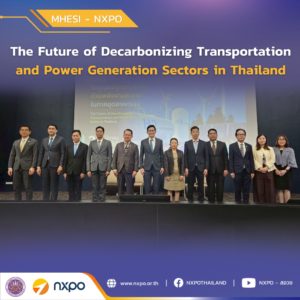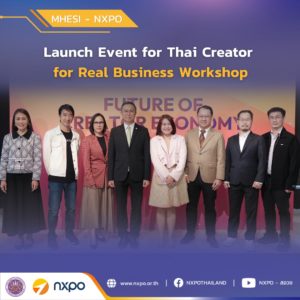
At the opening ceremony of the 16th Asia Pacific Roundtable on Sustainable Consumption and Production: Bridging Net Zero Transition by SCP and Circular Economy, NXPO President Dr. Kitipong Promwong delivered a keynote speech on “Mechanism for STI Collaboration on Circular Economy toward Net Zero Target in APEC Region”. The event, which took place on 21-23 November 2022 in Bangkok, was organized by SCP Association (Thailand) in collaboration with the Asia Pacific Roundtable for Sustainable Consumption and Production (APRSCP).

Dr. Kitipong said that an STI mechanism is vital for driving the circular economy as the issue requires collaboration from all sectors, both the public and private sectors as well as international partners. Circular economy will be instrumental in enabling Thailand to achieve net zero GHG emission target by 2065 – the goal that the Thai Prime Minister announced at the 2021 United Nations Climate Change Conference (COP26) in Glasgow, Scotland. At the recent COP27 held in in Sharm El-Sheikh, Egypt in November this year, there was active discussion on climate change adaptation, loss and damage and circular economy was identified as a solution for sustainable economic and social development.

Thailand’s Bio-Circular-Green Economy (BCG) model, proposed by NXPO, was declared the national agenda, uniting efforts from the public and private sectors. For the part on circular economy, NXPO has attempted to develop public policies to foster an ecosystem. As a result, a number of initiatives have been launched as well as a formulation of Circular Economy Innovation Ecosystem: Vision 2030.

In addition, NXPO also worked with several organizations to drive the circular economy transformation. Together with the Global Compact Network Thailand, the circular design course developed by CIRCO, the Netherlands, was brought to Thailand. Over 100 companies in 8 industrial sectors in Thailand have participated in the program. Discussion with the Office of SMEs Promotion has been initiated to expand this training to Thai SMEs.

For research and innovation, Program Management Units have been established to provide funding for research and development in a wide range of disciplines and purposes. The Program Management Unit for Competitiveness (PMUC), for instance, focuses on co-funding projects with industry and academic/research institutes to bring research to market.
For legal framework, the focus is placed on unlocking barriers to increase ease of doing business, as well as establishing sandboxes to test new ideas and technologies. Another aspect of circular economy development is the manpower. The emphasis is placed on increasing experts and specialists in carbon verification standard (CVS) and carbon credit trading. The last mechanism is dedicated to intermediary facilities. NXPO in collaboration with Thai SCP has set up CE Innovation Policy Forum as a platform bringing together organizations representing various sectors to exchange and discuss public policies and collaborations to drive CE agenda at the national and international levels.

The opening session also had other honorary and keynote speakers, including H.E. Mr. Varawut Silpa-archa, Minister for Natural Resources and Environment; Dr. Mushtaq Memon, Representative of the Regional Director of UN Environment in Asia and the Pacific; and Dr. Kongkrapan Intarajang, CEO of PTTGC.

On 22 November 2022, NXPO organized a roundtable on “Driving Forces for SCP & Circular Economy”. Chaired by NXPO Assistant to the President Dr. Surachai Sathitkunarat, the roundtable brought together representatives from government, academia, and industry from countries such as Thailand, the Netherlands, the Philippines, Malaysia and Stockholm Environment Institute (SEI) to present and discuss CE initiatives and best practices, allowing other countries to learn and use as a model to apply to their respective home countries.







